
Ida Kamińska was a Polish actress and director. Known mainly for her work in the theatre, she was the daughter of Avrom Yitshok Kaminski and Ester Rachel Kamińska, known as the Mother of the Jewish Stage. The Jewish Theatre in Warsaw, Poland is named in their honor. In her long career Kamińska produced more than 70 plays, and performed in more than 150 productions. She also wrote two plays of her own and translated many works in Yiddish. World War II disrupted her career, and she later immigrated to the United States where she continued to act. In 1967, she directed herself in the lead role of Mother Courage and Her Children on Broadway. In 1973, she released her autobiography, titled My Life, My Theater.
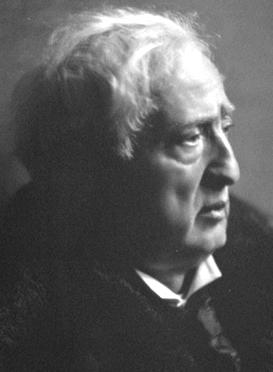
Jacob Pavlovich Adler was a Jewish actor and star of Yiddish theater, first in Odessa, and later in London and in New York City's Yiddish Theater District.
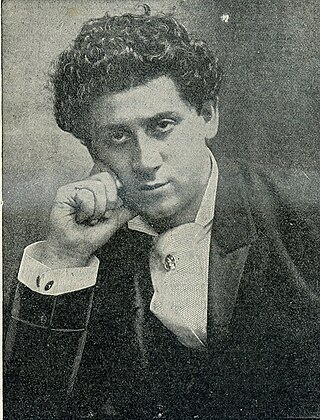
Boris Thomashefsky, born Boruch-Aharon Thomashefsky, was a Ukrainian-born Jewish singer and actor who became one of the biggest stars in Yiddish theater.

Israel (Yisrol) Grodner was one of the founding performers in Yiddish theater. A Lithuanian Jew who moved at the age of 16 to Berdychiv, Ukraine, Russian Empire, the Broder singer and actor was in Iaşi, Romania in 1876 when Abraham Goldfaden recruited him as the first actor for what became the first professional Yiddish theater troupe. Jacob Adler remarks that as the only Lithuanian Jew in the early years of Yiddish theater, he deliberately spoke a different dialect of Yiddish on stage so that it would blend better with the other actors.
Shmendrik, oder di komishe Chaseneh is an 1877 comedy by Abraham Goldfaden, one of the earliest and most enduring pieces in Yiddish theater. The title role of Shmendrik was originally written for the young Sigmund Mogulesko, and derived from a character Mogulesko did when auditioning for Goldfaden earlier that year. The role was first played by Jacob/Yankel Katzman with great reviews. The role was later famously played by actress Molly Picon.

Jacob Michailovitch Gordin was a Russian-American playwright active in the early years of Yiddish theater. He is known for introducing realism and naturalism into Yiddish theater.
IsraelRosenberg founded the first Yiddish theater troupe in Imperial Russia.
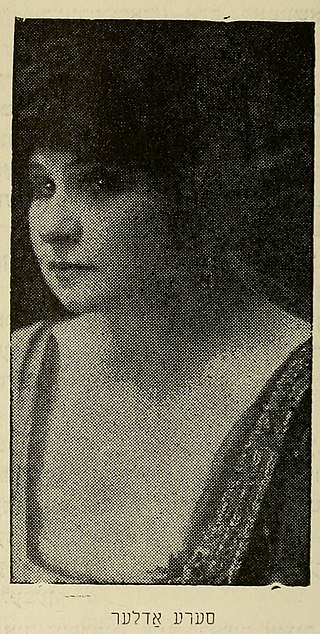
Sara Adler was a Russian actress in Yiddish theater who made her career mainly in the United States. She was known as the "mother" or "duchess" of Yiddish theater.

Celia Feinman Adler was an American actress, known as the "First Lady of the Yiddish Theatre".
Annetta Schwartz was one of the first distinguished female performers in Yiddish theater. She and her sister Margaretta shared prima donna duties in Abraham Goldfaden's troupe in Romania beginning in 1877. Jacob Adler described the sisters as "absolutely respectable" women with classical training as singers. He also writes that when they performed in Odesa, Ukraine in the late 1870s, they had Paris dresses of a quality that had never been seen in that city.
Breindele Cossack is a darkly comic 1887 Yiddish-language play by Abraham Goldfaden, generally accounted one of the best of his early works. The title character is a woman who, at the start of the play, has already driven five husbands to suicide. The play is centered on her and her sixth husband, Guberman, who marries her fully aware of her history and believing he will be different; however, she ultimately drives him to suicide as well.
Ni-be-ni-me-ni-cucurigu is an 1878 play by Abraham Goldfaden. The somewhat nonsensical Yiddish title is variously translated as Not Me, Not You, Not Cock-a-Doodle-Doo or Neither This, Nor That, nor Kukerikoo; Lulla Rosenfeld says it had an alternate title The Struggle of Culture with Fanaticism. The title comes from a Russian expression "ни бе, ни ме, ни кукареку", meaning to understand nothing on the subject.

David Kessler (1860–1920) was a prominent actor in the first great era of Yiddish theater. As a star Yiddish dramatic performer in New York City, he was the first leading man in Yiddish theater to dispense with incidental music.
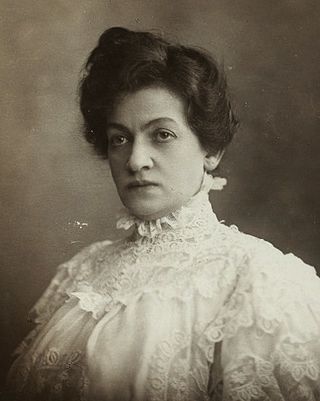
Keni Liptzin was a star in the early years of Yiddish theater, probably the greatest female dramatic star of the first great era of Yiddish theater in New York City.
Solomon the Wise is a 1906 play by Jacob Gordin, based on French sources, and loosely based on actual events in 17th century France, during the reign of Louis XIII and the ascendancy of Cardinal Richelieu.
Di shkhita was an 1899 Yiddish play by Jacob Gordin. The title refers to the Kosher slaughter of animals, and has been variously rendered in English as The Butchery or The Slaughter. The play is a protest against arranged marriage.
Dinah Shtettin was an English Yiddish theater actress. She was the second wife of Jacob Adler, with whom she had a daughter, Celia Adler, in 1889.

The Yiddish King Lear was an 1892 play by Jacob Gordin, and is generally seen as ushering in the first great era of Yiddish theater in New York City’s Yiddish Theater District, in which serious drama gained prominence over operetta.
The Worthless is a 1908 play by Jacob Gordin, described by Lulla Rosenfeld as "a study of provincial bigotry and fear", whose central character Ben Zion Garber is "a man of genius lost and misunderstood in an environment that ultimately destroys him".
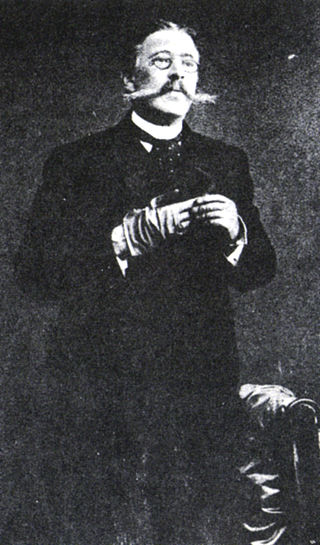
The Living Corpse is a Russian play by Leo Tolstoy. Although written around 1900, it was only published shortly after his death—Tolstoy had never considered the work finished. An immediate success, it is still performed. Arthur Hopkins produced its Broadway premiere in 1918 under the title Redemption, starring John Barrymore.











